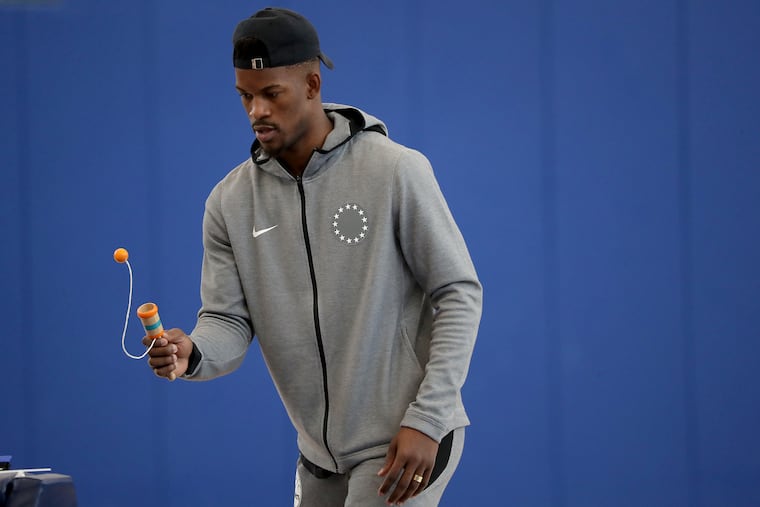Thus far, Jimmy Butler has been exactly what the Sixers needed this postseason | David Murphy
Butler is a little...different. But he's also the exact kind of player the Sixers were missing at this time last year.

Jimmy Butler is a different dude. There are a lot of other words you could call him, most of them juiced with negative implications. Weird, enigmatic, divisive, whatever. All fit the bill to some degree. But the current moment demands value neutrality. So, “different” it is. You saw it Monday afternoon before practice. As most of the rest of his teammates were getting themselves loose in advance of a film session, Butler was wearing a golf cap and playing with one of those wooden catch-ball children’s toys where the user attempts to land a ball on a string inside a small hand-held cone.
Jimmy Butler? Yeah. He’s just a little … different.
But he also happens to be the exact kind of player the Sixers were missing at this time last year. At least, that’s what he’s been through the first four games of their playoff-opening series against the Nets, whom the Sixers will look to finish off on Tuesday night at the Wells Fargo Center. Butler came to the Sixers with a reputation as a me-first volume scorer whose competitiveness came with the caveat that, while he wanted to win basketball games, he wanted to win them on his terms. Instead, he’s been the exact sort of glue guy that we in the media love to pen odes to.
Never was this more blatantly evident than in the baseline fracas that served as the turning point in Game 4, when Nets self-appointed instigator Jared Dudley delivered a sprinting shove to Joel Embiid in retaliation for what would later be called a flagrant foul on Jarrett Allen. By the time Embiid realized what was happening, Butler had inserted himself into the center of the proceedings, pushing Dudley away from the big man and into a dogpile that ultimately collapsed into the courtside seats. Keep in mind, Embiid had already missed a game with a knee injury and was clearly playing at less than 100 percent. From a practical standpoint, imagine what could have happened had Embiid’s gargantuan appendages been intertwined in that pile.
“We love playing with each other, being around each other," Embiid said. "We feel like we have a chance to accomplish something.
“When we understand each other, it goes along way. …Jimmy and I, we’ve gotten really close, so it doesn’t surprise me that he would have my back and he would do that for anybody on the team.”
Whatever Butler’s motivations, and the negative repercussions that could have occurred with his subsequent ejection, his actions had an impact on his teammates.
“I think moments like that do help,” said Ben Simmons, who spent the final 20 minutes of the game meting out his unique brand of physical punishment to the overpowered Nets. “I think that brings us closer.”
By the end of the postseason, Butler’s role in the Game 4 kerfuffle will almost certainly have been reduced to a footnote. On the other hand, his contributions on the court have been the sort of thing that can extend this playoff run to the length that the Sixers dream.
Really, his stat line only serves to camouflage his true impact. His 17.5 points per game are fourth on the team and roughly a bucket less than he averaged in 55 regular-season games for the Sixers. He hasn’t been quite the shooter they might have envisioned when they acquired him, doing most of his damage around the rim while hitting just two of his nine attempts from three-point range. But that makes his contributions all the more impressive, particularly on the defensive end of the court, where Butler’s performance during the regular season can most kindly be characterized as uninspired.
Something changed between Game No. 82 and the opening tip of Game 1, with Butler transforming into the player equipped with the on-the-ball defense we heard so much about at the time of the trade with the Timberwolves. Through four games, he has been everywhere on the court, racing back in transition, beating ballhandlers to the spot around screens, contesting shots with a remarkable combination of closing speed and quick-twitch hops that inspire considerable awe at the heights to which he can launch himself to get a hand in an opponent’s shooting radius.
In the 62 minutes that Butler has been on the bench this series, the Nets are averaging an obscene 122.2 points per 100 possessions. When he has been on the court, that number is just 105.8. That’s an incredible difference, nearly identical to the Sixers’ splits with and without Embiid (117.7 versus 101.2).
From a practical standpoint, the Sixers entered this series with little to accomplish. Up, 3-1, with a chance to close out the Nets at home, they are exactly where everybody expected them to be. But from a means-based perspective, this first-round series has given us some reason to believe that the Sixers really are far better-equipped to win a semifinals series than they were last season. Among five-man lineups that have played at least 30 minutes together this postseason, the Sixers’ starting unit has the best Net Rating in this NBA postseason, outscoring opponents by an average of 138.2 to 83.3 per 100 possessions (according to Basketball-Reference.com).
Butler has played a central role in that success. Sure, he might be a little bit different. But it might just be the sort of “different” that this Sixers team needs.